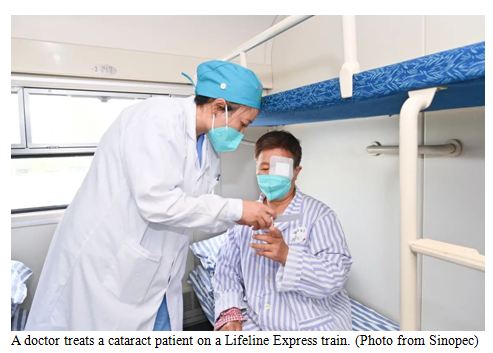By Liao Ruiling, People’s Daily
In Korla, Bayingolin Mongol autonomous prefecture, northwest China’s Xinjiang Uygur autonomous region, there is a train painted with rainbows – the “Sinopec Lifeline Express” hospital train.
The train, tied down to a track beside the Korla East Railway Station, began medical services on May 17 this year. It offers free cataract surgeries for local patients in need.
Abliz Bawudun, 72, from Langan township of Korla, developed blurry vision two years ago. He also suffered from diabetes and high blood pressure. Treating the disease was a heavy economic burden for his family.
After the “Sinopec Lifeline Express” hospital train was put into use, it launched cataract screening tests for local residents, and the 72-year-old thus had a free cataract surgery on the train.
The hospital train is a charity project for cataract patients jointly set up by China’s National Health Commission and the Chinese Foundation for Lifeline Express. Since 2002, Lifeline Express trains have made multiple trips to Xinjiang, offering free cataract surgeries for 11,220 patients in the autonomous region’s Aksu, Kashgar, Korla, Kuytun, Kizilsu Kirgiz autonomous prefecture, and Ili Kazakh autonomous prefecture.
The project has also set up ophthalmology centers at the People’s Hospital of Xinjiang Uygur Autonomous Region, the First People’s Hospital of Kashgar, the People’s Hospital of Yarkant County and the People’s Hospital of Kizilsu Kirgiz Autonomous Prefecture.
Though the train is not big, it is equipped with all necessary facilities such as examination devices, wards and operating rooms, and meets all medical standards, said Feng Jing, associate chief physician of the ophthalmology department of the Beijing Chao-Yang Hospital.
“We have professional internal medicine nurses, and are supported by relevant departments at our base hospital, so as to ensure the safety of all patients,” Feng added.
According to her, patients in complicated conditions would be transferred to the base hospital for treatment.
It is learned that apart from offering cataract surgeries onboard, the hospital train has dispatched a medical team to Ruoqiang and Qiemo counties that are not accessible by train to provide medical services for residents with poor vision there.
In Qiemo county’s Aketikandun township, Kuoshisatema township and Tatrang, the medical team launched screening tests for over 200 people and diagnosed nearly 100 cataract patients. These patients received free cataract surgeries in mid-July.
In Ruoqiang county, the medical team performed 36 cataract surgeries for local patients.
Sinopec joined the charity project in 2004 and donated 30 million yuan ($4.19 million) to build the “Sinopec Lifeline Express” three years later, which has been listed as a key national project for blindness prevention. So far, Sinopec has donated a total of 192 million yuan for the hospital train project.
The Lifeline Express trains have visited 47 places in 18 Chinese provinces, cities and autonomous regions, providing free cataract surgeries for more than 53,000 patients.

















